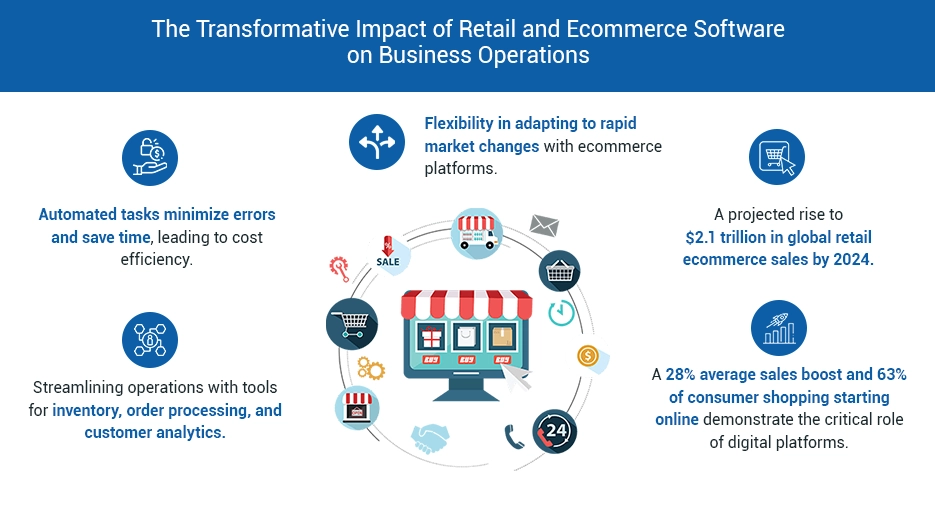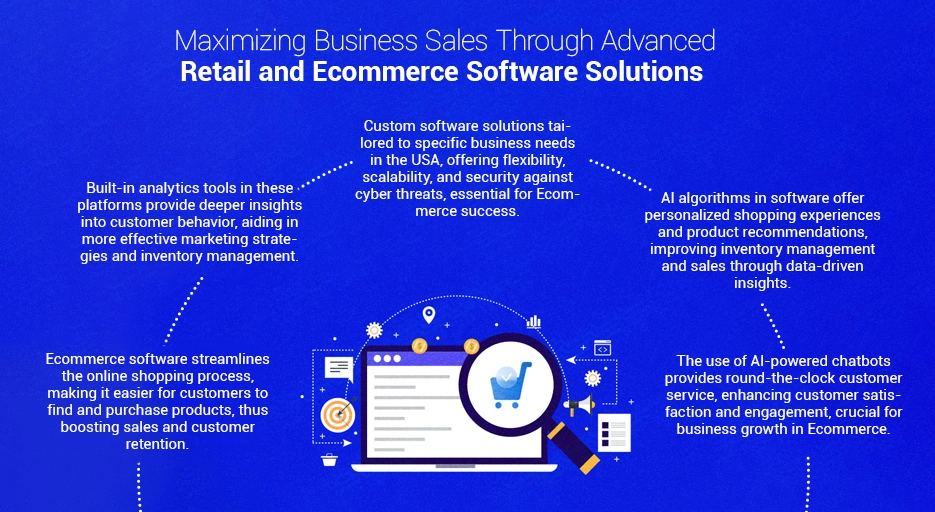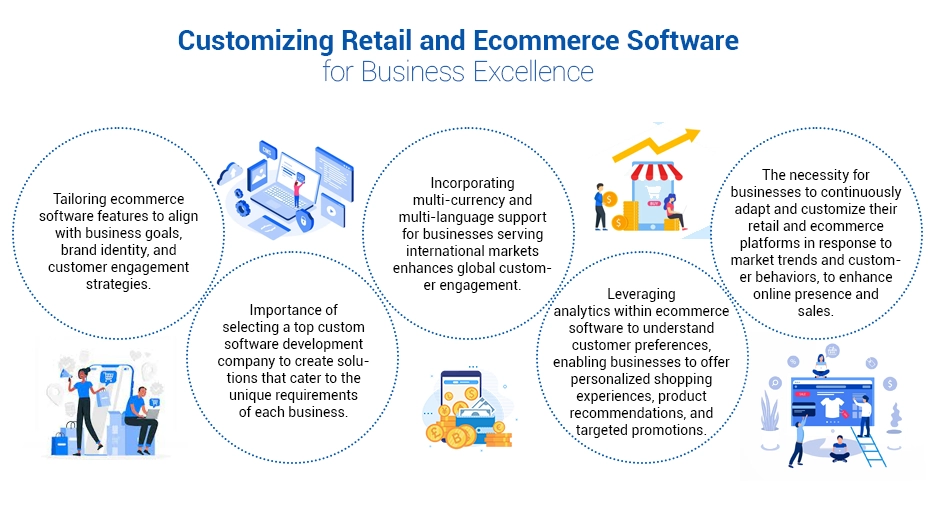Table of Contents
Retail and e-commerce software have transformed business-market interactions. These systems handle many tasks like inventory management, order processing, data analytics, and customer insights. The best software for retail business isn’t only for online sales; it creates an all-in-one system that improves all business operations.
A big plus of software is its comprehensive solutions that make business smoother. In today’s market, being efficient and quick is key to success. Ecommerce platforms automate tasks, cut down on errors, and save time.
A study predicts global retail ecommerce sales will hit $2.1 trillion by 2024, showing a thriving online market. Another report from IBEF shows a 28% average sales increase for businesses using ecommerce software. Plus, 63% of shopping begins online, highlighting the need for strong digital platforms.

The Importance of Retail and Ecommerce Software in Today’s Business Landscape
Retail and e-commerce software is crucial for business success in our fast-changing digital age. This digital shift has reshaped how markets work and how we connect with customers.
Impact on Market Dynamics
E-commerce software changes business operations. In our digital-focused world, these platforms give a competitive advantage. For example, IoT software development lets companies automate and make their operations more efficient, saving time and money.
Recent data from Statista shows that ecommerce platforms are a big part of global retail sales. By 2027, they’re expected to make up 23% of total retail sales worldwide. This highlights the move to online shopping and e-commerce’s vital role in this market.
Advanced tech like AI and IoT in ecommerce lets businesses manage inventory and logistics and provide tailored customer experiences. This tech progress is changing retail, pushing businesses towards innovative solutions to stay ahead.
Analysis of Customer Behavior and Expectations
Knowing customer behavior and expectations is key today. Ecommerce software gives valuable insights into what customers prefer and how they buy. This information helps businesses customize their products and services, aligning with customer needs and expectations.
Customers now look for a smooth, personalized shopping experience. Ecommerce platforms make this possible with features like custom recommendations, easy site navigation, and quick checkouts. These improve customer experience, increasing satisfaction and loyalty.
Integrating transportation and logistics software with ecommerce platforms has also transformed delivery. Customers now enjoy quicker, more reliable delivery, a major factor in their buying decisions.
Empower Your Business with Cutting-Edge Software. Request a Free Consultation Today!
Essential Key Features to Look for in Retail & Ecommerce Solutions
Choosing the right retail and ecommerce software is key for digital-age business success. This part focuses on crucial features of these solutions, especially in user experience (UX), interface design, and inventory management.
User Experience and Interface Design
The UX and interface design of software are vital in drawing and keeping customers. More than just looks, a well-designed interface makes for an intuitive, smooth user experience. This is critical as good user experience links directly to customer satisfaction and higher sales conversion rates.
Data shows that great interface design can boost a website’s conversion rate by up to 200%, and better UX design can lead to up to 400% higher conversion rates. This underlines the need for ecommerce software with a user-friendly design.
Look for features like simplicity, easy navigation, and quick load times. Retail software should make shopping easy, from product browsing to checkout. It should also work well on mobile devices, as many shops use smartphones and tablets.
Ecommerce software providers know the interface is more than design – it’s key for engaging and keeping customers. Custom software development services often allow tailoring UX/UI to specific business needs, giving a competitive advantage.
Inventory Management Capabilities
Effective inventory management is another crucial e-commerce software feature. It’s important to balance stock correctly – too much increases costs, too little leads to lost sales and unhappy customers.
A good e-commerce platform should offer real-time inventory tracking. This helps inform stock-level decisions, reorder points, and storage costs. Features like automated reordering and predictive analytics can improve inventory management, making predicting demand easier and preventing stockouts or overstocking. These tools help keep ideal inventory levels and offer insights into sales trends and product performance.
When picking retail software, focus on user experience, interface design, and strong inventory management. These features are essential for a seamless shopping experience, optimized operations, and driving sales and growth.
Top 15 Retail & E-commerce Software to Increase Business Revenue in 2025
1. E-commerce CMS Software
Ecommerce Content Management Systems (CMS) are key in online retail. If you run an ecommerce platform, using SaaS-based e-commerce software brings many benefits. This software handles a lot of content well. It keeps track of important things like product prices, weights, and images. This makes sure your online store is up-to-date and meets customer needs. But it’s more than just displaying product information. This software also follows user demographics, giving valuable insights into your customers.
One big part of this software is how well it works with other systems. In the e-commerce world, linking different systems is crucial for efficiency. You create a more effective setup by connecting your CMS with key software like Enterprise Resource Planning (ERP) and Customer Relationship Management (CRM). This integration smooths out workflows, improves communication, and boosts efficiency. It’s a move towards digital transformation, aligning your eCommerce with modern business practices and technology. This method is central to digital transformation services, helping your e-commerce business keep up in the rapidly changing digital market.
2. E-commerce Mobile App Solution
Ecommerce Mobile App Solutions are changing how online stores work. With cloud-based apps made for e-commerce, managing your store becomes much easier. You can handle your ecommerce activities right from your phone. These apps offer real-time inventory updates, ensuring you always have enough stock. They also alert you about product dispatches. This constant information flow keeps your operations smooth and efficient, which is key for any successful online store.
Another important feature of this e-commerce software is mobile payment options. In our fast-moving world, customers want and expect quick, safe ways to pay. Adding mobile payment methods makes shopping easier and more user-friendly. It’s not just about simplifying payments; it’s about building customer trust and happiness by offering a smooth and secure checkout experience.
3. E-commerce PoS Software
You can build custom POS systems like VeriFone, Clover, etc., and integrate them with popular payment gateways like PayPal, Braintree, and Amazon to receive payments securely. Ask your retail software development partner to deliver custom payment solutions with support for credit/debit cards, prepaid cards, gift cards, and more.
Brick-and-mortar retail software is the best option for retailers today to deliver a modern, fast, and seamless in-store shopping experience. 62% of the customers still like to visit a physical store because they like to “see, touch, feel, and try out” items before making a purchase. So, you must invest in quality software today. Have a look at some of the most popular retail software solutions that you can utilize for exponential business growth:
4. Retail Management Software
A retail management system comprises a set of integrated tools or applications for retailers to streamline their business process. You can use it for managing multiple aspects of your business – from inventory management to sales operations, and everything in between. Key benefits include faster payment processing, increased efficiency, better promotion, and much more. A few of the key features are:
- Inventory management
- Customer management
- A purchasing and receiving feature
- Sales data management
- A Customer Database
- Barcode scanning
- A reporting feature
5. Retail Inventory management Software
Managing inventory well is crucial in retail. Retail Inventory Management Software is a key tool for this. You can track everything about your inventory, from when you order items to when they are dispatched. It also updates you on deliveries and sales, showing you exactly what stock you have.
E-commerce software becomes even better with technologies like barcodes, RFID sensors, and digital twins. These technologies work with inventory software to track items in real-time and give accurate data. Barcodes and RFID sensors make it easy to follow each item through the supply chain, ensuring you know exactly your inventory. Digital twins create a virtual model of your inventory, allowing for deeper analysis and predictions.
6. Retail Customer Relationship Management Software
Retail CRM software is key to building and improving customer relationships. This software helps you analyze past data, clearly showing how customers interact and behave. With these insights, businesses can strengthen customer bonds by tailoring their approaches to fit specific needs and likes. Cloud-based CRM tools are especially effective. They’re flexible and scalable, vital for meeting market changes and customer expectations.
These cloud-based CRM systems are essential for increasing sales and keeping clients. They let businesses group their customers based on factors like what they’ve bought before and what they prefer. This grouping leads to marketing strategies that are more focused and successful. This helps build customer loyalty and boost sales. Understanding and predicting customers’ wants is a big advantage in the competitive retail market.
Ready to Build? Let’s Create Your Software Solution Today!
Mobile App Development EDI Development Custom Software Development
AI Development
7. Retail Analytics and Reporting Software
The strength of these tools is their ability to look back and analyze trends. They examine product demand, customer behavior, and how much stock you have. This gives you valuable insights. Understanding these trends and what customers like helps you plan your strategies better. In the competitive retail world, making choices based on data is key.
E-commerce software solutions also allow you to make custom reports and graphs. You can choose how to display data that’s most important to your business. Using these tools can improve your strategy planning and improve business performance.
8. Retail ERP Software
ERP streamlines all major processes and data across your business for higher efficiency. ERP solutions are used in diverse industries – from healthcare to finance and other sectors. Optimize your retail workflow by gathering critical data from multiple departments and customer touchpoints. Key benefits include optimized business workflow, higher operational efficiency, centralized data storage, and in-depth reports for sales, marketing, and inventory functions. Check out the features:
- Inventory management
- Customer management
- Employee management
- Sales data management
- Warehouse management
- Product management
9. Omni-Channel Retail Software
Having such software allows you to exercise a fully integrated marketing approach across all online and offline company channels. Customers get a unified experience while buying products or services from your website or brick-and-mortar store when you apply this tactic. Key benefits of using omnichannel software include better customer experience, increased sales, better brand visibility, higher operational efficiency, etc. Consult a veteran retail software development company to get a custom solution that suits your needs.
10. Retail POS Software
A point-of-sale system is a combination of software and hardware that allows merchants to take transactions and simplify key day-to-day business operations. Yamaria Grullon, Manager of Content Strategy At ShopKeep.
The global retail POS market is growing fast and will be worth $40.41 Billion By 2024. Investing in a retail POS solution is a must for business today. It ensures faster invoicing, billing, checkout, and ultimately better customer service. It also helps you track inventory and analyze sales trends to stay future-proof of abrupt demand. As a small retailer, the use of such e-commerce software is ideal for you and your employees to track and record daily sales, manage customer data, and more.
11. Retail HCM Software
In retail, employees are crucial. They are the backbone of your business and the key to its success. To manage and support your team well, high-quality Human Capital Management (HCM) software is essential. This software efficiently handles employee management. It covers performance tracking, timekeeping, and benefits distribution, making sure your workforce is managed well.
Customizing your HCM software is important for optimizing your retail business’s HR operations. Working with the right software solution provider is crucial. Custom software development companies in USA are experts at making tailored HCM tools that fit your specific business needs. A custom solution means a better match for your unique business processes and challenges, leading to better management of your human resources.
12. Logistics Management Software
Logistics is the heart of any retail business and keeping it operational anytime is of the utmost priority. To ensure uninterrupted logistics workflow and delivery of goods, use quality logistics management software in your retail business. Look out for tools that can integrate with third-party logistics vendors (FedEx, UPS, DHL) via APIs.
For managing the tedious day-to-day store and back-office tasks at your grocery store, using custom software is ideal. It helps you automate and streamline the most crucial tasks that bring value to your business.
13. Grocery POS system
A Point of Sale (POS) system is essential for smooth payment processing in a busy grocery store. This system is made to make transactions quick and easy. Your grocery team can record sales daily without trouble, making transactions faster and more accurate. A good POS system speeds up the checkout line and lowers the chance of mistakes. This is important in a fast-moving retail environment.
Besides just handling payments, a POS system in your grocery store has more benefits. These systems show a full picture of sales and what you have in stock. This lets you manage your stock better, ensuring your shelves have the right products. Also, advanced POS systems can give you insights into what sells best. This helps you make smart choices about what to stock and what promotions to run.
14. Supermarket CRM Software
Managing customer expectations is vital for increasing sales and profits in the competitive supermarket industry. Supermarket CRM software is an essential tool for this. It tracks customer data, helping you understand customer likes and habits. This information is crucial for effectively handling customer complaints and questions. Building strong customer relationships is more important than ever in today’s market, where customer loyalty greatly affects business success.
CRM solutions in supermarkets are about more than just handling customer interactions. They help you stay ahead in the market. These solutions efficiently manage marketing campaigns, rewards, and loyalty programs. Using custom CRM software, you can ensure these programs fit your customers’ unique needs, boosting their engagement and loyalty. Customizing your CRM is important. It ensures that your approach perfectly matches your supermarket’s goals and customers’ expectations.
15. C-Store HCM Software
Managing employees well is key for smooth business in the convenience store (C-Store) world. Human Capital Management (HCM) software is crucial for this. It makes HR processes like onboarding new staff and tracking time easier. This reduces the manual work in managing employee details and attendance, saving time for more important tasks.
HCM software in C-Stores is also great for monitoring employee performance. With custom reports and visuals, gives you a full picture of key employee trends. These can include salaries, how well employees perform, and how long they stay. Having this information helps you make better decisions about your workforce. Understanding these patterns is important for meeting employee needs and keeping them motivated.
Additionally, using HCM software in C-Stores simplifies managing employee expectations. It makes HR management more organized and effective. This contributes to your business running smoothly. In short, an HCM tool is not just for administrative tasks. It’s a strategic asset that boosts employee satisfaction and helps your convenience store succeed.
How Effective Retail and Ecommerce Software Can Impact Business Sales

In today’s competitive market, Ecommerce software is crucial for boosting business sales. This software makes online shopping easier, helping customers find and buy products smoothly. A big plus of software is the smooth shopping experience it offers. This is key for keeping customers and attracting new ones. Also, these platforms often have analytics tools. These tools help businesses understand customer behavior better. This leads to more effective marketing and inventory management. Retail software allows companies to work more efficiently, cut costs, and increase sales.
Custom software development companies in USA are vital for Ecommerce growth. These companies create custom software solutions that meet each business’s unique needs. This personalized approach ensures the software fits perfectly with a business’s operations and goals. Custom software is flexible and scalable, important for businesses in the fast-changing digital world. Plus, these companies offer ongoing support and updates. This keeps the Ecommerce platform efficient and safe against new cyber threats. Working with a top custom software development company gives a big advantage in Ecommerce.
Artificial intelligence in software development is changing the Ecommerce industry. AI algorithms analyze lots of data, giving insights faster and more accurately than humans. This lets businesses offer personal shopping experiences. AI-driven suggestions can boost sales by recommending products based on customer history.
The Latest Trends and Innovations in Retail and Ecommerce Technology
The world of retail and ecommerce is always changing, thanks to new tech and different consumer habits. This change brings fresh trends and innovations in retail business software solutions.
Innovate, Automate, and Excel with A3Logics Custom Software Development Services
Emerging Technologies Shaping the Future
In ecommerce, staying updated with new tech trends is key. One trend is adding artificial intelligence (AI) to ecommerce platforms. AI changes online shopping with personalized recommendations and better customer service. For example, AI chatbots now handle complex customer questions, offering an interaction level once only possible in physical stores.
Augmented reality (AR) is another big trend in ecommerce. AR lets customers see products in their space before buying, greatly improving the shopping experience. This tech has been shown to increase engagement and satisfaction, with studies showing AR can raise conversion rates by up to 40%.
Blockchain is also important in ecommerce. Known for security and transparency, blockchain is used for better supply chain management and payment processes. This improves efficiency and builds customer trust.
Criteria to Choose the Right Ecommerce Software for Your Business
Selecting the right ecommerce software is crucial for any business entering or expanding online. This software is key for running an online store and shapes the customer experience and the business’s efficiency.
Aligning Software Capabilities with Business Objectives
First, make sure the software matches your business goals. Businesses have different needs based on size, products, market, and long-term plans. For example, a small business in a niche market might need a simple, easy-to-use platform. A larger company might require a more complex solution with many customization options.
Identify the main features that support your business aims. If you want to reach more customers, choose ecommerce software with multiple languages and various payment options. If improving the user experience is your goal, select software with advanced UX/UI features.
Consideration of Scalability and Integration
Scalability is another vital factor. Integration is just as important. Your software should work well with other systems you use, like CRM software, accounting tools, and inventory management. This helps keep data consistent and operations efficient.
Custom software development consulting can offer valuable advice here. Consultants can suggest which platforms are best for scalability and integration for your specific needs. Custom software development companies and other places often provide tailored solutions, giving your business an advantage.
In summary, picking the right ecommerce software involves analyzing how well it fits your business goals and its scalability and integration features. These points ensure the platform meets your current needs and supports your business’s future growth.
Strategies for Integrating Retail and Ecommerce Software into Existing Business Operations
Bringing retail and ecommerce software into your existing business is crucial for growing your digital presence and streamlining operations. Although complex, the right strategies can boost efficiency, customer experience, and sales.
Step-by-Step Guide for Seamless Integration
- Understand Your Business Needs: Know your business needs before adding new software. Identify key areas for improvement like inventory, customer relationships, or sales tracking.
- Select Suitable Ecommerce Software: Choose software that fits your business goals. Look for ecommerce management software with the necessary features, scalability, and compatibility with your current tools.
- Plan the Integration: Make a detailed integration plan with a timeline, team roles, and a backup plan for any surprises.
- Train Your Staff: Train your team well on the new software. Good training ensures a smooth switch and fully uses the software’s features.
- Test the Integration: Test the new system thoroughly to fix any issues before full implementation. This step helps avoid disrupting your business.
- Launch and Monitor: After testing and training, start using the software. Keep an eye on the system to address any problems quickly.
Overcoming Common Challenges
- Data Migration: Moving data to new software can be tough. Work with your software provider for a smooth shift. Data migration tools can also help.
- System Compatibility: If the new software doesn’t fully match your current systems, look for custom solutions or middleware to connect them.
- Change Management: Staff might resist new software. Explain the benefits and involve them in the process to ease the transition.
- Business Continuity: Keep your business running during integration. Implement the new system in stages or during less busy times.
In conclusion, integrating retail and ecommerce software into your business takes careful planning, the right tools, and flexibility. With these steps, businesses can effectively use ecommerce solutions to improve operations and grow.
Security Measures in Retail & Ecommerce Software
Ecommerce software needs to follow data protection laws like the GDPR in the European Union or the CCPA in the United States. These laws set strict rules on handling customer data.
Best Practices in Cybersecurity for Ecommerce
- Update Software Regularly: Cyber threats are always changing, so updating software is vital. Update your ecommerce software and all connected systems with the latest security patches.
- Use Secure Payment Gateways: Pick software with encrypted payment gateways to protect against fraud and keep customer payments safe. Look for software with SSL certification.
- Implement Multi-Factor Authentication (MFA): Use MFA for customer and admin accounts. This extra security step greatly lowers the risk of unauthorized access.
- Monitor for Threats: Use continuous monitoring tools to quickly detect and respond to threats. Staying proactive can stop breaches before they happen.
- Train Your Employees: People can accidentally cause security issues. Regularly teach your staff about security best practices and new cyber threats.
- Outsourcing to Experts: If you lack the right in-house skills, think of trusted custom software development outsourcing. They can build and maintain secure ecommerce solutions with expert knowledge.
How Businesses Can Tailor Retail and Ecommerce Software to Meet Their Specific Needs
In retail and ecommerce, it’s important to make your software fit your needs. Businesses should adjust their software to be unique. This means choosing options to change it, staying adaptable, and using data to make customer experiences personal.

Customization Options and Flexibility
Changing your ecommerce software is key. It helps businesses align the software’s features with their goals, brand, and ways to connect with customers. Tweaking parts like how the software looks or works, like payment options or how you manage stock, really helps.
Finding the best custom software development companyto develop software is a big step. These pros make software that meets your business’s special needs. They get that every business is different, so they provide just the right solutions.
For example, a business that sells to the world might need to handle many currencies and languages. A company that develops custom software can add these parts, making the platform friendly for global customers.
Leveraging Analytics for Personalized Experiences
Personal touches in ecommerce can make a big difference. Businesses can create unique customer experiences by analyzing data, making them happier and more loyal.
Ecommerce software with good data analysis can watch what customers do, what they like, and what they buy. This info helps businesses get to know their customers better and suggest things they might like, offer deals, or share interesting content.
In short, changing your retail and software to meet your business’s needs is very important in today’s market. Adjusting your software, being flexible, and using data to personalize are key ways for firms to improve their online presence, improve customers’ experiences, and sell more.
How to Select the Best Retail and Ecommerce Software Provider in 2025
Picking the right retail and ecommerce software provider is vital for businesses looking to succeed in the digital world. As 2025 approaches, the eCommerce field is changing fast. Companies must choose a provider that meets their needs and supports future growth and market changes.
Evaluating Vendor Reputation and Support
- Reputation: A provider’s reputation tells you about their reliability and service quality. Look for providers known for high-quality solutions and great customer service. Reviews and testimonials give good insights into their abilities and client satisfaction.
- Customer Support: Good customer support is key, especially with complex ecommerce platforms. Ensure the provider offers full support, including training, troubleshooting, and updates. Providers with 24/7 support are especially valuable as ecommerce runs all the time.
Assessing Long-term Partnership Potential
- Scalability: Your provider should have scalable solutions that grow with your business. The software must handle more traffic and transactions without losing performance.
- Innovation: Choose a provider committed to innovation, updating their software with the latest features and tech. Providers that keep up with technology trends, like AI or recent developments in digital transformation in healthcare, offer more advanced and future-ready solutions.
- Alignment with Business Goals: The provider’s solutions should fit your business goals and strategies. The software must be flexible for your needs, whether integrating with current systems or customizing your business model.
In summary, picking the best retail and ecommerce software provider in 2025 means carefully evaluating their reputation, customer support, scalability, innovation, and alignment with your business goals. This careful choice is crucial for businesses to thrive in the digital landscape and fully benefit from e-commerce.
Transform Your Software Vision into Reality – Book a 30-Minute Free Consultation!
Mobile App Development Logistics & Supply Chain Development AI and Deep Learning
Salesforce Development
Conclusion
E-commerce software will likely offer even more personal and engaging experiences. We expect to see more advanced use of AI and AR, turning shopping into interactive journeys, not just transactions.
Ecommerce tools are becoming easier to use, helping businesses of all sizes join and do well in the online market. This change means small companies can now reach customers worldwide.
Also, as data privacy and security concerns grow, ecommerce platforms will likely develop stronger security features. This ensures safe interactions for businesses and their customers.
The future of retail software looks bright. These tools are evolving beyond basic buying and selling platforms. They are becoming key parts of a business’s identity and essential for building lasting customer relationships.
With the right tools and strategy, there are endless possibilities. Explore your options and begin your journey withA3Logicsto a more efficient, secure, and customer-focused online business.





